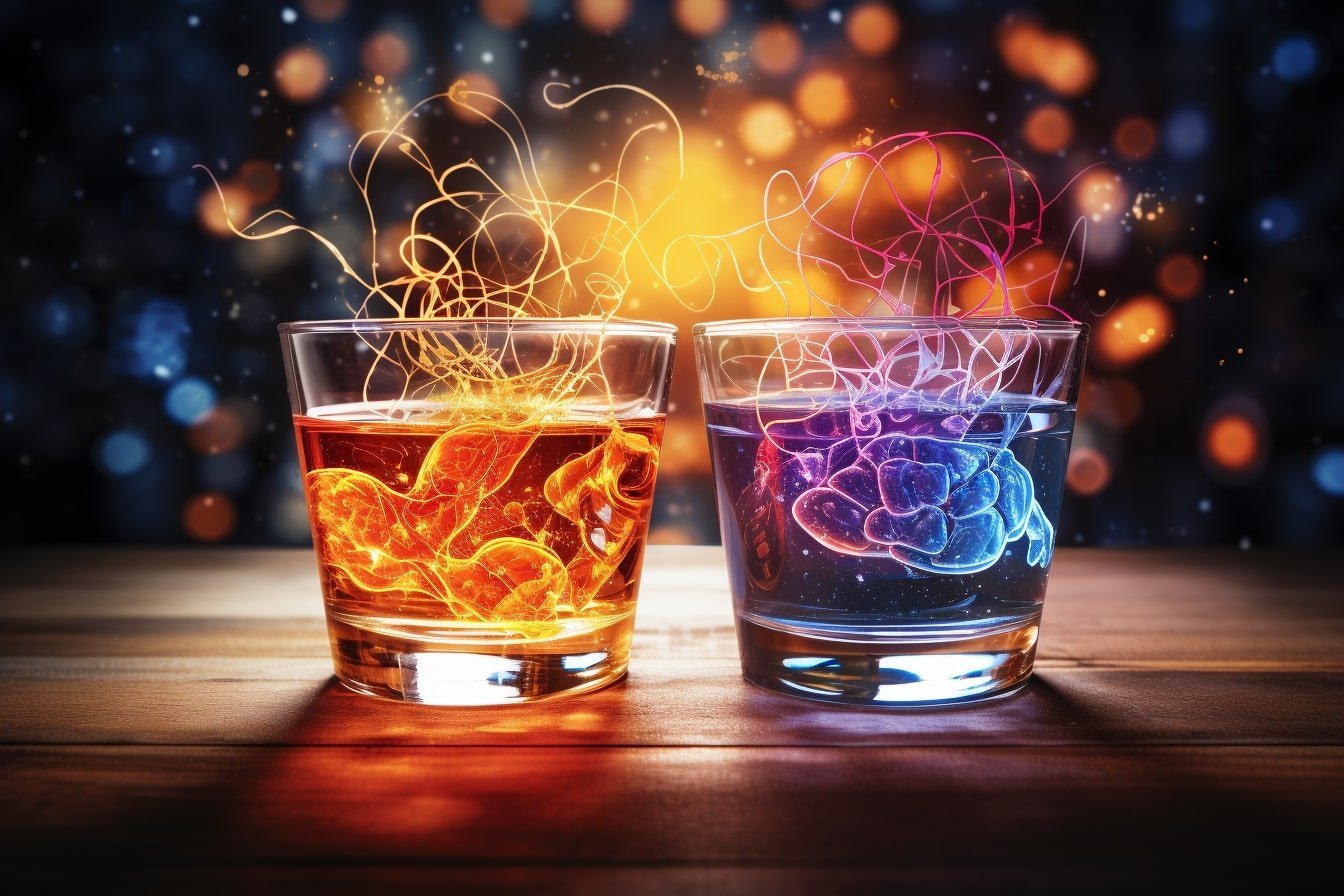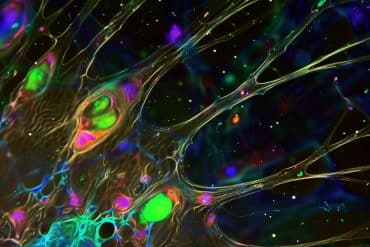Summary: A new study discovered a link between alcohol use disorders (AUDs) and alteration of a group of genes known to influence neuronal plasticity and pain perceptions.
The team used three distinct animal models to identify the genes responsible for drinking behaviors. They found that genes mediating pain sensation act together with two other groups of neural genes involved in neural communication.
The research opens the door to the possibility of genetic testing for alcoholism.
Key Facts:
- The study used three different animal models to analyze nearly 30,000 genes and identified a connection between AUDs and groups of genes affecting neuronal plasticity and pain perceptions.
- The identified genes interacted with two other groups of neural channel and neural excitation genes which perform neural communication functions.
- The study suggests that early identification of a high genetic tendency towards alcoholism could help individuals moderate their drinking and lead to more focused treatment or prevention strategies.
Source: Indiana University
An estimated 16 million people in the United States have alcohol use disorders (AUDs), according to the National Institutes on Alcohol Abuse and Alcoholism (NIAAA).
Now, Indiana University researchers have made a substantial discovery in the role genes play in the development of AUDs, finding that alteration of a group of genes known to influence neuronal plasticity and pain perceptions, rather than single gene defect, is linked to AUDs.

“We know inherited genes are a major contributor to this disease, because past studies have shown family genetics to be directly associated with alcohol dependence within a family, such as identical twins raised in different environments,” said Feng Zhou, PhD, professor emeritus of anatomy, cell biology and physiology at IU School of Medicine.
Zhou is the lead author, along with William Muir, PhD, professor emeritus of genetics at the Purdue Department of Animal Sciences, of a new publication in Alcohol: Clinical and Experimental Research which details their new findings.
Researchers used three different animal models created in the IU Alcohol Research Center to study how the genes impact desire for alcohol. The study involved statistically sorting through about 3 billion DNA base pairs containing nearly 30,000 genes, in 70 individual animals to identify the handful that were responsible for drinking behaviors.
Thanks to their experimental design, the researchers could identify population differences based on drinking behaviors rather than chance genetic differences or other environmental influences.
“These rat models are all uniquely qualified as criteria for human outcomes,” said Zhou.
The genes that mediate pain sensation act in concert with two other groups of neural channel and neural excitation genes which perform neural communication functions, the team found.
“The function of these three groups of genes is important for neuroadaptation and neuroplasticity, meaning that they can change brain communications,” Zhou said.
They also discovered a key cohort of genes impacted alcohol use, with some of the genes having silent mutations, meaning they did not alter the amino acid sequence translated, but influenced the rate and conformation of gene transcription, causing changes in the other genes that had an impact on alcoholism.
“This is the first time these multiple models have ever been used for this pursuit,” Muir said.
“In the past, research has focused on a single gene and how it can contribute to alcohol use, but now, we can see that these large groups of genes make a difference, which can help guide future research and clinical care for those suffering from AUDs.”
“The brain must be modified over the drinking period. That kind of modification is similar to drug abuse,” Zhou said.
“It is genetically prone neural plasticity or neural adaptation to a certain level that makes drinking more pleasurable and more tolerable, or pain relief.”
“The alleviation of pain appears to be one motivation to drink and continue to drink,” Muir said. “Knowing that, it’s possible that early counseling can produce drinking avoidance.”
The new findings raise the possibility of genetic testing for alcoholism. People who get tested and know that they have a high genetic tendency to become an alcoholic might take extra care to moderate their drinking.
“One future direction is how these animal findings would translate to humans,” Zhou said. “If verified, then treatment or prevention can be more focused.”
Other study authors include Chiao-Ling Lo, PhD and Richard Bell, PhD of IU School of Medicine and the Indiana Alcohol Research Center at IU School of Medicine.
About this genetics and neuroplasticity research news
Author: Christina Griffiths
Source: Indiana University
Contact: Christina Griffiths – Indiana University
Image: The image is credited to Neuroscience News
Original Research: Open access.
“Multi-animal-model study reveals mutations in neural plasticity and nociception genes linked to excessive alcohol drinking” by Feng Zhou et al. Alcoholism Clinical and Experimental Research
Abstract
Multi-animal-model study reveals mutations in neural plasticity and nociception genes linked to excessive alcohol drinking
Background
The basis for familial alcohol use disorder (AUD) remains an enigma due to various biological and societal confounds. The present study used three of the most adopted and documented rat models, combining the alcohol-preferring/non-alcohol-preferring (P/NP) lines and high alcohol-drinking/low alcohol-drinking (HAD/LAD) replicated lines, of AUD as examined through the lens of whole genomic analyses.
Methods
We used complete genome sequencing of the P/NP lines and previously published sequences of the HAD/LAD replicates to enhance the discovery of variants associated with AUD and to remove confounding with genetic background and random genetic drift. Specifically, we used high-order statistical methods to search for genetic variants whose frequency changes in whole sets of gene ontologies corresponded with phenotypic changes in the direction of selection, that is, ethanol-drinking preference.
Results
Our first finding was that in addition to variants causing translational changes, the principal genetic changes associated with drinking predisposition were silent mutations and mutations in the 3′ untranslated regions (3′UTR) of genes. Neither of these types of mutations alters the amino acid sequence of the translated protein but they influence both the rate and conformation of gene transcription, including its stability and posttranslational events that alter gene efficacy. This finding argues for refocusing human genomic studies on changes in gene efficacy.
Among the key ontologies identified were the central genes associated with the Na+ voltage–gated channels of neurons and glia (including the Scn1a, Scn2a, Scn2b, Scn3a, Scn7a, and Scn9a subtypes) and excitatory glutamatergic secretion (including Grm2 and Myo6), both of which are essential in neuroplasticity. In addition, we identified “Nociception or Sensory Perception of Pain,” which contained variants in nociception (Arrb1, Ccl3, Ephb1) and enlist sodium (Scn1a, Scn2a, Scn2b, Scn3a, Scn7a), pain activation (Scn9a), and potassium channel (Kcna1) genes.
Conclusion
The multi-model analyses used herein reduced the confounding effects of random drift and the “founders” genetic background. The most differentiated bidirectionally selected genes across all three animal models were Scn9a, Scn1a, and Kcna, all of which are annotated in the nociception ontology. The complexity of neuroplasticity and nociception adds strength to the hypothesis that neuroplasticity and pain (physical or psychological) are prominent phenotypes genetically linked to the development of AUD.







